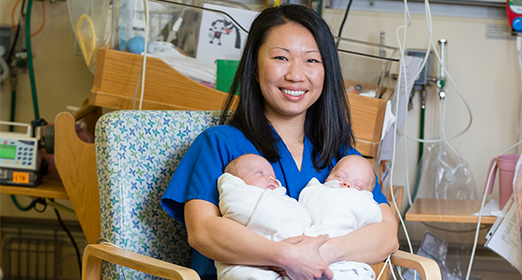Jacklin Tong was a senior in high school when her father became seriously ill with lung cancer and went to Stanford for treatment. She recalls how cared for the nurses made her family feel during that difficult time.
Her dad returned to their San Jose home where he received hospice care, and Tong helped at his bedside. That’s when she knew that she wanted to work in health care someday. And she wanted to work at Stanford.
Tong found her way to Stanford in 2011. She started as a nurse in the Intermediate Care Nursery (ICN) at Lucile Packard Children’s Hospital, and now she moves between the Neonatal Intensive Care Unit (NICU) and other nurseries as a “float” nurse, going where she is needed most.
Tong is a nurse “who quietly goes about her work, caring for some of our smallest and youngest patients at Packard. She treats them as if they are her own, with love and compassion,” says Sheryl Goldstein, RN, MS, director of patient care services at the Johnson Center for Pregnancy and Newborn Services.
“Even though it’s busy and the work can be sad and challenging, knowing that you’re able to help or positively affect the families, that’s what we’re here for,” Tong says.
One such family is the Figueiredos. Caden and Wyatt Figueiredo weighed just two pounds each when they were born at Stanford on December 23, 13 weeks early. By mid-March, the pudgy-cheeked identical twins weighed nearly eight pounds. They were learning to eat and breathe on their own and would be ready to go home soon to Livermore with their parents, Courtney and Chris Figueiredo. Courtney had already returned to work as a nurse next door in the adult hospital.
“I can’t be here all of the time, and I leave knowing my babies are in good hands. It’s such a relief knowing Jacklin can be here with them,” Courtney says. “Once you get to know a baby, you can read the signs. She is really good at that.”
Passion for Research
Tong also discovered that she was good at performing evidence-based practice research. After coming to Stanford, she decided to explore a whole new side of health care—one that she hadn’t before imagined. “A lot of nurses feel like ‘oh no, research.’ People get turned off by it, but it’s everyday here,” she says. “Research is huge.”
Given its ties to Stanford University and the School of Medicine, Packard Children’s encourages nurses to conduct original research and lead projects in evidence-based practice, which helps bring research findings to the bedside. Because of the amount of time they spend caring for patients, nurses are ideally positioned to understand patient needs and initiate innovative solutions.
In 2016, Tong decided to research ways to speed up the transfer of babies from the NICU to the ICN and other nurseries. If babies could be transferred more quickly, she thought, it would save parents waiting time and cut down on high NICU costs.
“She truly believed that there has to be a better way,” says her mentor Annette Nasr, RN, PhD, nurse scientist and associate clinical professor in the Department of Pediatrics. “She is someone who will always ask questions. It’s individuals like Jackie who help us create new pathways for nursing and really positively impact the care we provide.”
Tong found that transfers usually took three to six hours due to a shortage of nursing staff to care for the babies being transferred. She recommended additional staffing for transfers and hopes someday the staffing requirements will change.
Overcoming a Disability
Still, she wants to do more. Next month, she will graduate from the University of California, San Francisco with an advanced degree as a neonatal nurse practitioner.
“Annette encouraged me to go back to school,” Tong says. “You can make so much more of a change when you have your advanced practice degree. She helped me see that it’s possible. I never thought that it was possible.”
That’s because school hasn’t always been easy for Tong, who has complete hearing loss in her right ear. In high school, she felt too embarrassed to wear a hearing aid and self-conscious about asking people to repeat themselves.
“My hearing disability was holding me back before, but I realized it really shouldn’t,” Tong says.
In the future, Tong wants to investigate more ways to contribute to improvements in patient care. Nursing research is an emerging and growing field in which she can apply her advanced degree to discover innovations that will benefit patients and advance the field of nursing.
“There aren’t a lot of nurses who are actual principal investigators,” she says. “It would be great to see more of that.”
Make a Gift
Make a gift in honor of a nurse or care provider. We'll send them a note to let them know you were thinking of them. Your gift will help ensure that other families receive the same outstanding care. Visit supportLPCH.org/donate to make your gift.
This article originally appeared in the Spring 2018 issue of Packard Children’s News.
Photography credit: Toni Bird
